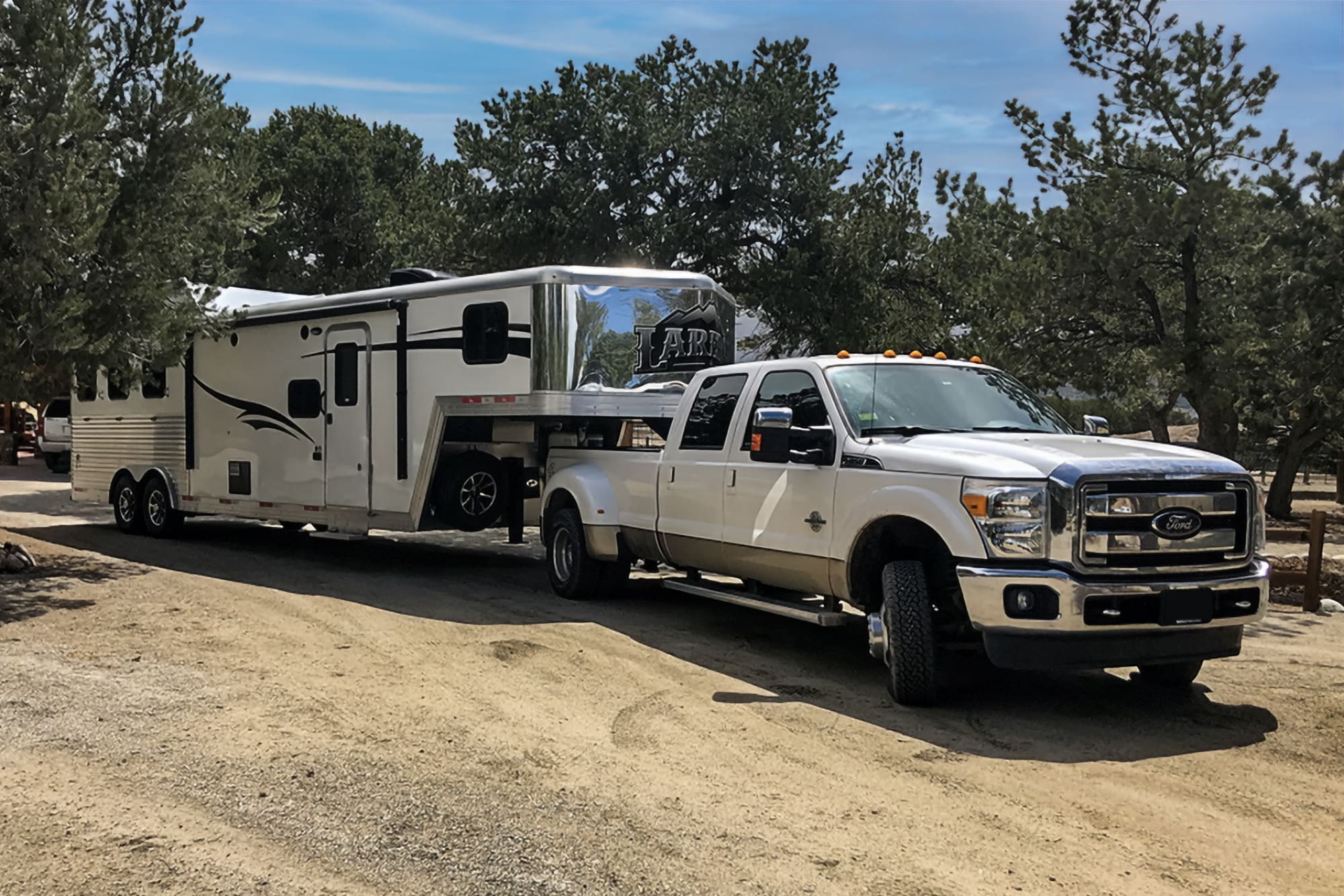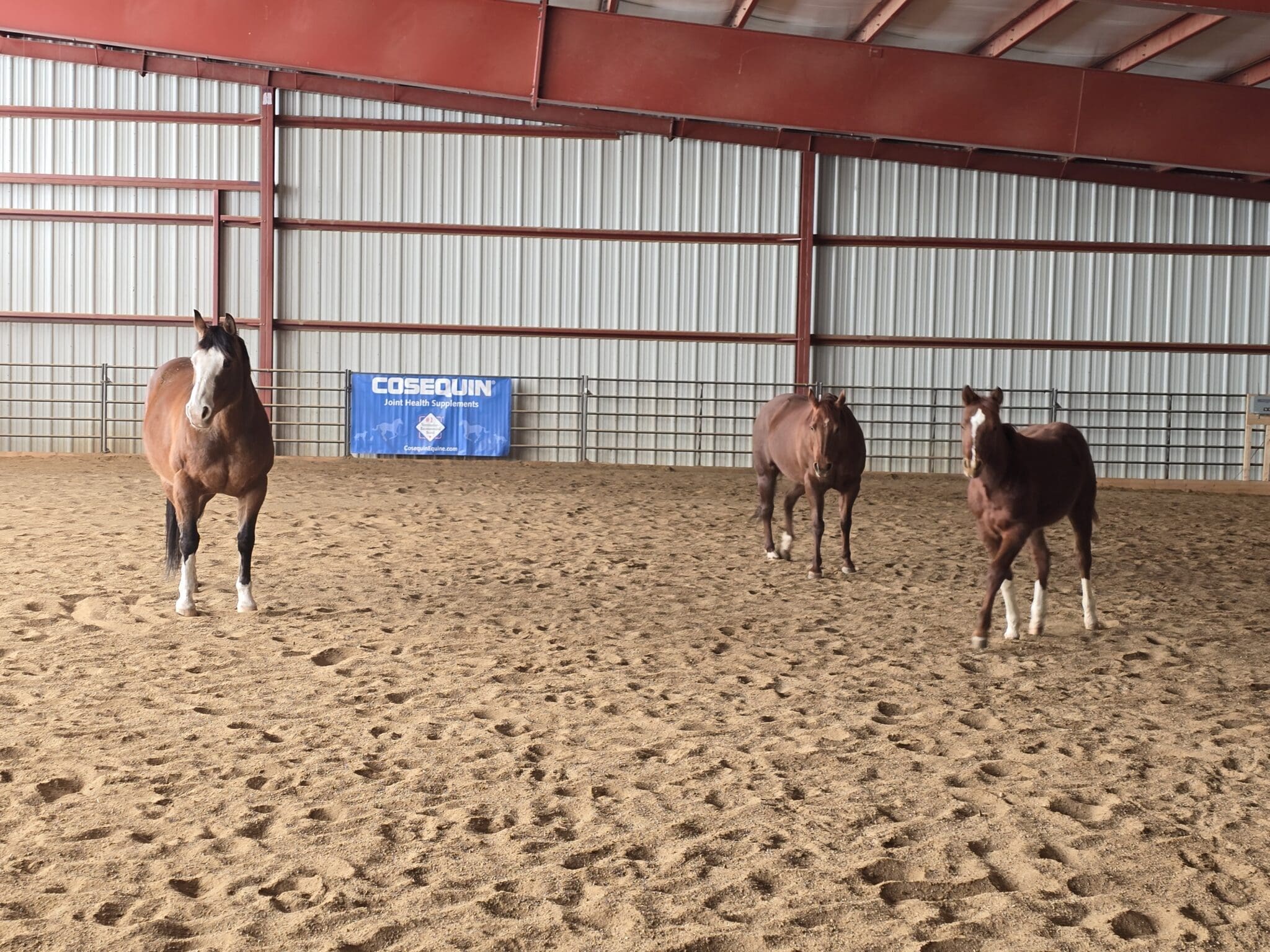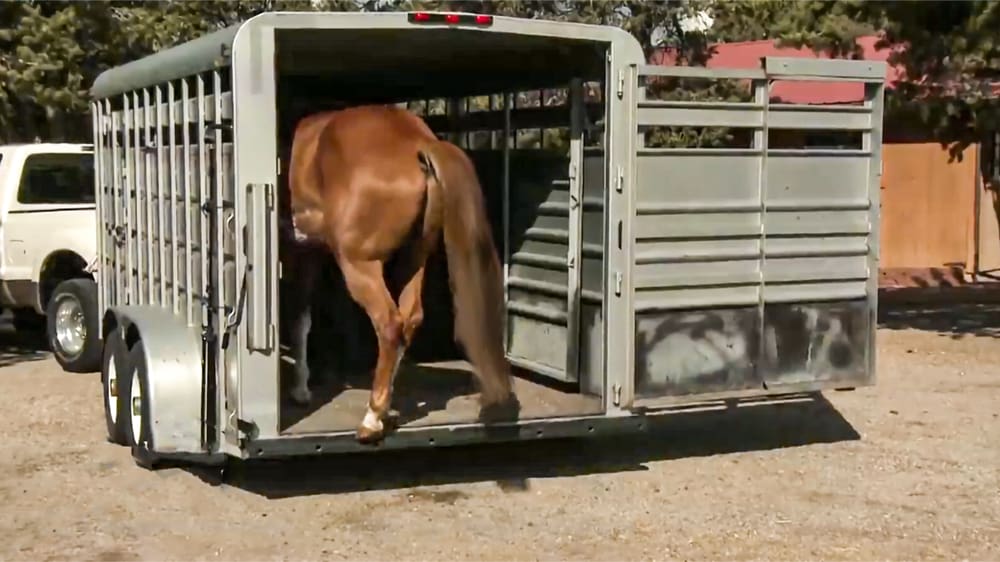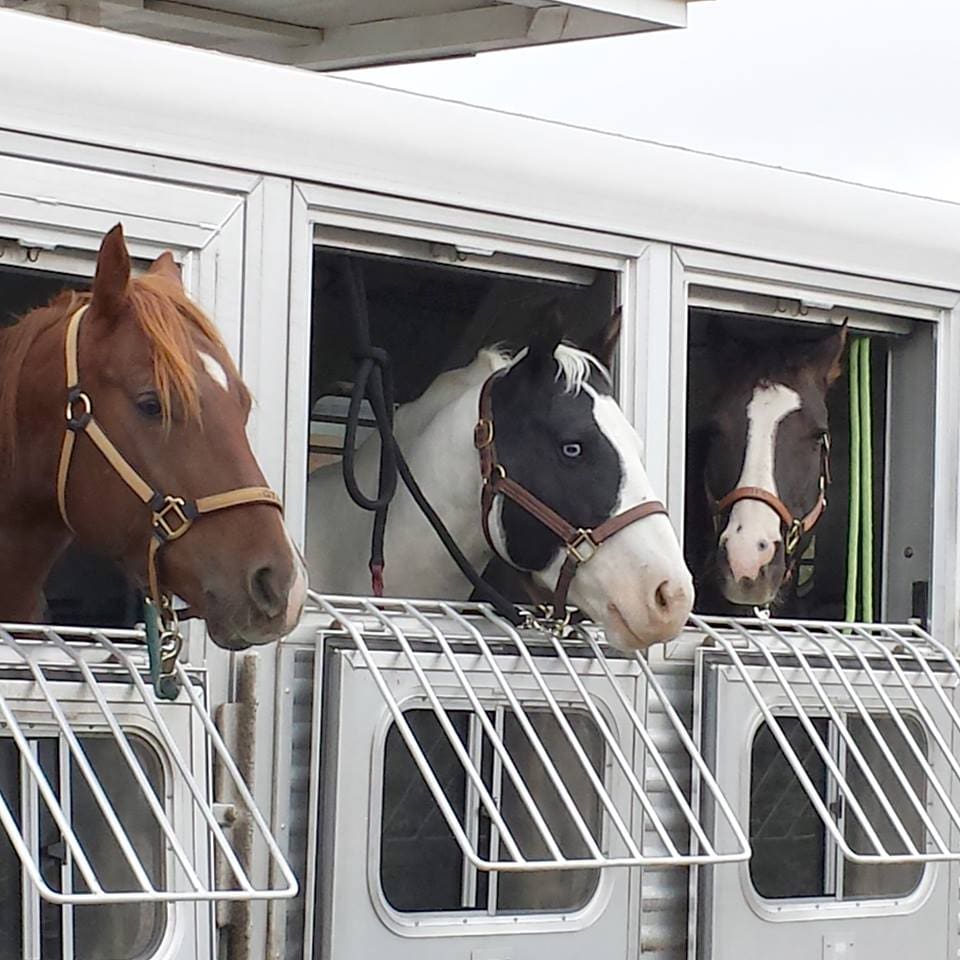
There’s a lot to consider when it comes to traveling with horses, and I’ve learned a lot of things to do (and not to do) over the years. Whether you are hauling 10 minutes or 10 hours away, make sure you’re prepared the next time you hit the road with your horse. These are the things I check off my list when I’m getting ready to travel.
My Pre-Trip Routine
I’m a little bit of a stickler when it comes to vehicle and trailer maintenance. Before I even think about hooking up my trailer, it’s imperative to make sure both are up-to-date on maintenance and safe to take on the road.
I keep up with all service recommendations like oil changes, tire rotations and other regular maintenance. (I love my new truck because I receive regular emails that show me the truck’s maintenance records, current status, and alert me to any system that needs attention.)
Once a year, in the spring, we bring our horse trailers to a mechanic to have the wheel bearings greased and a front-to-back safety check, including tires, wire harness, trailer brakes, lights, and the trailer’s emergency brake. We also pull up mats once a year to inspect the trailer’s floor.
I’m fortunate to have a truck dedicated to hauling so it’s always ready to go. After each trip I take, I go to the carwash, scrub it inside and out, refuel, and top-off the fluids. I also like to hook up my trailer a day or two before my trip, so I have plenty of time to organize and load stuff, and I want to make sure it’s on a full tank before I hitch up.
I always muck out the inside of my trailer right after I arrive at my destination and unload the horses. I also take my trailer to the carwash after a road trip. Road grime is corrosive over time, so the undercarriage and outside need regular attention. At least once a year, I clean the inside of the trailer with soap and disinfectant and a high-pressure wash.
Hitchin’ Up Safely
With over half a century and thousands of miles of hauling horses, I’ve seen some crazy wrecks. Over the years, I’ve learned two really important lessons about trailer hitches:
- Never tag-team hooking up a horse trailer. Just one person should be in charge of it from start to finish, using a methodical process. It’s too easy for something to be missed when two people are hitching up—I think you hooked the safety chains, but you think I did it. This can lead to critical mistakes being made.
- No matter who hooks up the trailer, the driver is responsible for the hitch and for the safety of all parties. Check it twice. Then do a complete walk-around again before pulling out.
Once the trailer is hitched, my travel companion (usually my husband) and I check brakes, brake controller settings, and trailer lights. The next step is to park it in a convenient place for loading all the feed, tack and equipment we’ll need for the trip.
Pre-Departure Checklist
I’m a big fan of making a list and checking it twice. Often, I start with a really long list several days ahead of the trip. As I gradually load gear, the list gets pared down until I end up with two or three items on a post-it. I’ve made so many lists for horse trips that I can practically do it in my sleep, but I still write it down and check it again and again.
Here’s a basic list you can use, just add on things unique to your journey (items with an asterisk are extras I keep loaded in the trailer all the time, so I never forget them):
- Hay and grain
- Medications
- Shavings
- *Water buckets with hangers/straps, hay nets, feed pans
- *Muck bucket and manure fork
- *Horse first aid
- *Farrier tool kit
- *Horse documents (copies of Coggins, health certificates, brand papers, etc.)
- Saddles, bridles, saddle pads
- Horse blankets/sheets
- *Spare halter and bridle
- *Tools for unforeseen repairs, tire changing gear, chocks
Comfort & Safety for Horses
We have four different horse trailers—each for a different purpose, and each set up differently for how we use it. How far I am traveling, how the horse space is configured (stock, slant, divided or not), and how well it ventilates all have a bearing on my horse’s comfort.
The most important factor in your horse’s comfort while on the road is ventilation. In a closed-in trailer, especially with more than one horse, it can get hot and steamy even in the coldest weather. Opening roof vents over the horse’s back and cracking open windows in front and back of the horse to ensure adequate airflow. Whenever we stop, I stick my head inside to get a feel for the air quality in there.
If the horses are going to be in the trailer for more than an hour, I always spread a small layer of shavings to absorb urine. I just put it under the back half of the horse and I use a minimal amount of shavings. With all the ventilation open, it can get dusty in there with too much shavings. I never use shavings in the stock trailer for that reason.
Unless it’s below 20 degrees outside, I prefer that my horses stay uncovered in the trailer, and I do not wrap legs if I can avoid it. My horses will stay cooler and more comfortable naked, and fixing wonky apparel in the trailer can be challenging.
Load & Go
Once the trailer is hitched, completely loaded with gear, and made ready for the horses’ comfort, it’s time to start the truck and make a final pit stop for myself. I wait until the very last minute to pop the horse’s in the trailer, jump in the truck and go. I avoid loading horses and hanging out because they can get anxious and impatient. Once the trailer is moving, they tend to settle in for the ride.
I always tie my horses in the trailer using a safe clip. I adjust the length of the lead so that there is just enough slack for the horse to hold its head comfortably, but not enough slack that it can turn its head and neck around behind him. The safe clip gives a slow release should the horse pull on it and makes it quick and easy to hook the horse to the ring, unhook to unload, and then snap them right onto the tie rings on the outside of the trailer.
It is important to train your horse to load, unload, and get them comfortable riding in a trailer long before you make your first trip. Time and again, I see people attempting to train a horse to load at the very time they need to go somewhere. It rarely has a satisfactory result, especially in the event of an emergency. You owe it to your horse to make trailering as easy as possible, and that includes training him over time—not in the heat of the moment.
There are many good techniques for training a horse to load and unload from a horse trailer, but the technique I use, to me, gives the best result. You can check out my training technique online—it’s highly effective and generally happens fast. But even after the horse is trained to load and unload, we must spend some time getting it used to being locked inside the trailer and riding in a moving trailer, taking small steps and allowing the horse to get comfortable over time.
Enroute
There are few situations in which I would take the risk of unloading horses for a walkabout during the trip. I prefer to get where I am going asap, and let the horses rest and recuperate on the other end.
If we are driving for more than an hour or two, when we stop for gas or a bite to eat, we pause long enough for the horses to relax. I drop down the windows and hang a hay bag outside the window so they can look around and get some fresh air. We will always offer them water, but many horses are reluctant to drink when traveling.
Driving slowly with minimal use of the brakes makes the trip easier for the horses. I like to imagine a full glass of water on the dashboard and if I corner or brake enough to make the water slosh, I know my horses are sloshing around too. The horse constantly works to maintain balance in the moving trailer, and it’s hard work. It’s entirely up to my driving skill as to whether or not the horse has an easy ride or a hard ride.
Hauling your horse doesn’t have to be nerve-wracking. When you’ make a through plan that you’re confident in, it relieves a lot of the risk and stress. Advance preparation makes everything go much smoother from departure to arrival, and helps ensure a pleasant trip.


